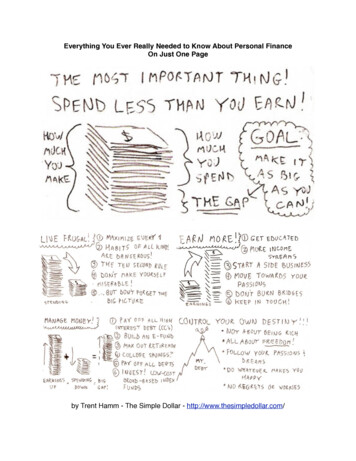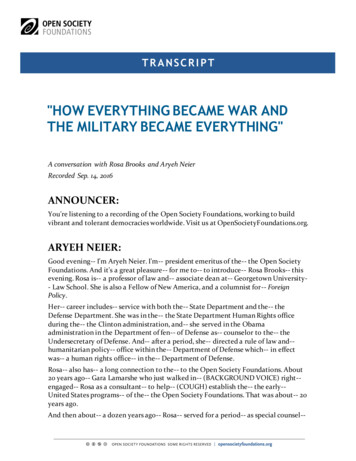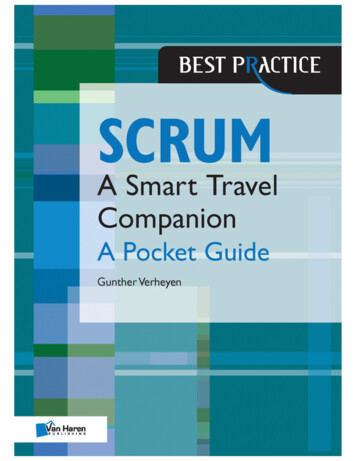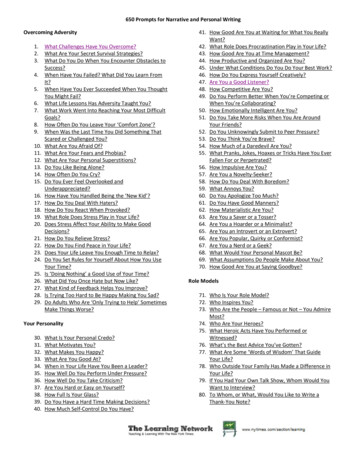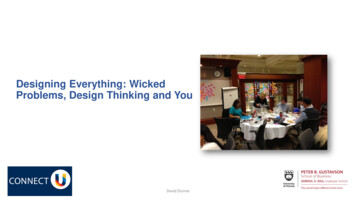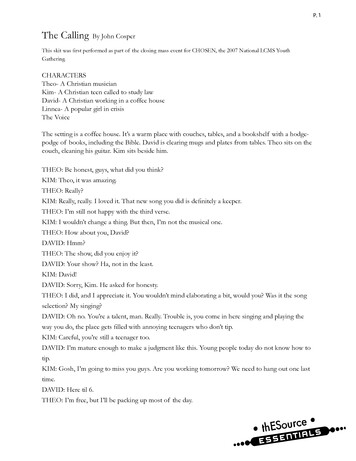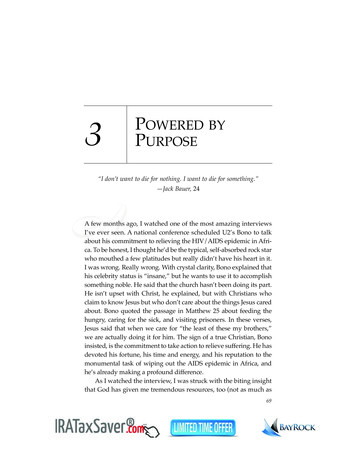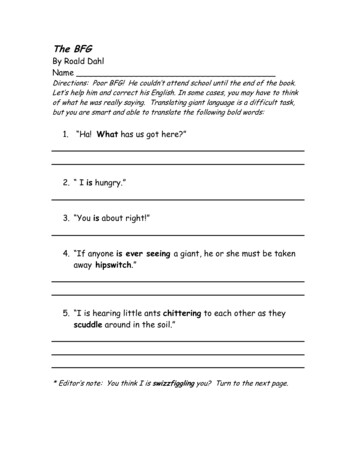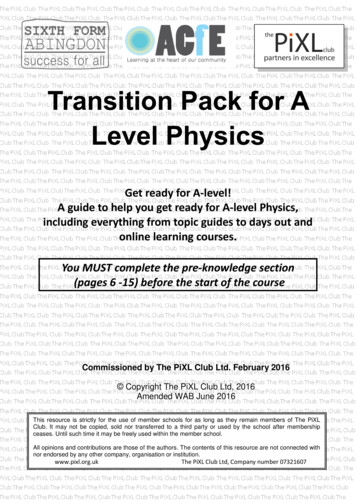
Transcription
EverythingYou Ever ReallyNeeded toKnow AboutPERSONALFINANCEby Trent Hamm
IntroductionEverything you really need to know about personal finance can be summarized in just one page.Spend less than you earn. Earn more. Live frugal. Do something sensible with the difference.Control your own destiny. All of the other writing out there on personal finance is just details. Infact, the rest of this document is just details. The hardest part of personal finance is just havingthe courage to take that first step. That’s where this e-book comes in.My storyI was born in raised in downstate rural Illinois. Growing up, my familydidnʼt have a lot of money, but they did have a lot of love. They taughtme the value of living frugally, but it wasnʼt always coupled with greatfinancial lessons. In short, I had little idea how to manage my ownmoney, and when I left home for college, I made a long sequence offinancial mistakes. Flash forward to April 2006. I had a good job, wasmarried, and had an infant son, but I still hadnʼt learned the value ofmanaging my money. To put it simply, I had a financial meltdown,capped off by a long night of soul searching while facing a pile of billsthat I simply couldnʼt afford to pay.That experience woke me up. I dove into personal finance books,reading them by the hundreds. I started throwing the book at ourterrible financial state, trying every tactic that I read about. And itworked. Over the course of two years, we paid off two car loans, fivefiguresʼ worth of credit card debt, five figuresʼ worth of student loandebt, and several personal loans. This turnaround laid the foundationfor many things we had only dreamed about to that point – we boughta home, had another child, built a strong emergency fund, and,eventually, I was able to change careers and become a writer, taking apay drop but living out a dream Iʼd had since I was a child.How did I do it? The cover of this document tells the truth of the matter.Itʼs the blueprint for all of these great changes in my life.Want to know more? Let’s go.Everything You Ever Really Needed to Know About Personal Finance2
01Spend less thanyou earnAnnual income twenty pounds, annual expenditurenineteen nineteen and six, result happiness.Annual income twenty pounds, annual expenditure twentypounds ought and six, result misery.— Charles Dickens, David Copperfield
In the end, this is the fundamental rule of personal finance: spend less than you earn. Itʼs theone point that comes up time and time again in almost every personal finance book you reador talk that you hear.Itʼs easy to see it when you look at each side of the coin. Letʼs say you earn 30,000 a year andyou spend 31,000 a year. That extra 1,000 has to be borrowed, often from sources like creditcards. The following year, in order to maintain your lifestyle, you still spend 1,000 a year morethan you make, plus you spend 300 more than that just making the minimum payments onyour debt, leaving you a total of 2,200 in the hole (the 1,000 extra you spent the first year plusthe 1,000 extra you spent the second year plus the 300 extra you spent repaying that debtminus the 100 you actually managed to pay off). The debt builds – after the third year, you’re 3,600 in debt. It keeps growing and growing and growing until that debt is eating up all ofyour income, leaving you in misery.On the other hand, letʼs say you only spend 29,000 a year – only 2,000 less in spending. Thatextra 1,000 goes into your savings account and earns 3%. The next year, you drop another 1,000 in the account and now you have 2,030 in there. The next year, another 1,000,bringing you to 3,060.90. That money builds up and soon you have a house down payment orthe seed money to start the small business of your dreams – or even something as simple as theability to easily pay for a car repair without your heart skipping a beat.The difference between these two stories is only 2,000 a year. There are two avenues toachieving this goal: spending less and earning more. By working on either (or both) of theseareas, you can increase the gap between those two numbers – and that gap is your ticket tofreedom. The harder you work on either spending less or earning more, the bigger that gap willbecome and the quicker that train to your dreams will arrive at the station.Letʼs look at each side of that coin.Everything You Ever Really Needed to Know About Personal Finance4
02It’s better to hang out with people better thanyou. Pick out associates whose behavior is betterthan yours and you’ll drift in that direction.— Warren BuffetEarn more
Get startedSo how does one earn more? Many people will argue that there is no universal way for peopleto earn more money, and theyʼre right: some people are born entrepreneurs, others functionmuch better in an office environment. Some people are endlessly creative, others are masters atcompleting long lists of tasks.Once you dig past that, though, there are some common things that anyone can do, regardlessof their financial state, to earn more money.The best way to get started is found in your own workplace.Go to work well-restedand presentableNever show up to work looking like you just rolled out of bed. Take ashower, wear clean clothes, use deodorant, brush your teeth, and doyour best to look presentable. Also, get a good night of sleep beforework so that you can be as mentally and physically fresh as possible.Every interaction you have in the workplace will reflect eitherpositively or negatively upon you, and you can very easily increase thepositive-ness of those interactions by just taking a half an hour tomake yourself presentable.Everything You Ever Really Needed to Know About Personal Finance6
Minimize negativecommentsEvery work environment provides ample opportunities for negativity,whether itʼs just workplace gossip or your manager is asking questions.While it might feel good to participate in the negativity of gossip, donʼt(feel free to listen, but donʼt jump in with the negativity). Even whensupervisors are seeking comments on other workers, hold back on thenegativity and look for what positives you can find. Negativity in theworkplace drags everyone down and positivity lifts everyone, so stickwith the positive.Donʼt “backstab” anyoneAlong those same lines, youʼll have many opportunities to “sell out”others in the workplace. Avoid it at all costs. If you have an opportunityto discuss other workers or particular situations, you might perceivethat piling on those workers or those situations will benefit you – rarelyis that actually true. Instead, look for the positives you can outline aboutanyone or anything.If you have downtime,find something useful to doMany workplaces have times where there is simply downtime – youʼrewaiting on new customers, youʼve finished your current project, and soon. That downtime is key in separating the people who get ahead fromthe people who get left behind. Find things to do with that time thatʼsuseful. Clean up your workspace. Clean up the store. Work on a lowpriority project. Improve your skills. There are always things that can bedone – donʼt just sit or stand around to be told what to do.Everything You Ever Really Needed to Know About Personal Finance7
Do every task youʼregiven as well as you canWhen youʼre given a minor, menial task, itʼs often very tempting to doit with minimal effort just to get it done. Youʼre supposed to sweepthe floor, so you do it mindlessly and do a mediocre job. Youʼre givensomething to type up, but you donʼt bother to check it for typos. Youʼregiven a mundane system administration task, so you overlook a basicstep. Instead of falling into that trap, try to give your complete focus tothe task at hand and do it as best you can.Learn from (and emulate)the people who do their job wellIn most workplaces, itʼs easy to identify the top workers. Theyʼre theones that managers defer to and ask for advice. Theyʼre the ones whoalways seem to come through with the things that need to be done. Asa result, they have job stability, plenty of options, and likely a very solidsalary. Learn from these people. Ask them plenty of questions abouthow they get things done. Watch what they do, particularly with theirdowntime. In some situations, it might even be appropriate to ask themto be your mentor.Build positive relationships witheveryone in the workplaceYou do nothing but gain from building a positive relationship witheveryone in your workplace, from the highest level of managementthat you can easily interact with the person who empties the trashcans. Be friendly to everyone. Ask how their day is going. Find somecommon interests and talk about them. The more people youdevelop positive relationships with (both up and down the hierarchy),the better off youʼll be.Everything You Ever Really Needed to Know About Personal Finance8
Ignore poisonous peopleEvery workplace seems to have a poisonous person or two. I knowiʼve interacted with plenty of such people in my years – and in a fewcases, theyʼve really reduced the quality of the work environment andmade me more negative. If youʼre stuck with a poisonous person, justminimize all interaction with that person.When you do have to interact, stick with the facts and get back to yourown tasks. That person might spew some poison about you, but mostworkplaces have pretty clearly identified the poisonous people andtake what they say with a grain of salt, so donʼt let their responses orbackstabbing bother you. Get your work done and move on with life.Never use your sick leave as“extra vacation”In one environment where I worked, this problem was endemic. Assoon as a person had enough sick leave built up to take even a singleday off, that person called in “sick” like clockwork – with one exception.Want to guess who the one person was that received a raise and then,later, a promotion was? Itʼs fine to use your sick leave when youʼreactually ill, but consistent and reliable presence in the workplace is ahuge benefit for your long-term career goals.Improve yourself in your spare timeThe simplest way to do this is to work on getting in better shape. Getsome exercise and eat a healthy diet. Doing this will improve both yourenergy and your appearance, things that are purely beneficial in anywork environment. If you have a job that requires some specific skills,find ways to improve those in your spare time as well. Keep up to dateon your specific area of knowledge. Learn what you would need toknow to take the next step in your career.Everything You Ever Really Needed to Know About Personal Finance9
Step up to challenges whenthey present themselvesWhen a challenging situation comes up, donʼt shy away from it. Step upto the plate and give it your best shot. If you think it might be over yourhead, ask for help when you need it. If you show yourself able to handlechallenging tasks, youʼll become a more valuable employee, and a morevaluable employee gets more perks.Be a leader when itʼs neededWhen difficult situations occur, every workplace benefits from havingsomeone they can rely on as a leader. Be the person that speaks for theworkers during a meeting. Be the person who helps people out whentheyʼre going through a crisis. Eventually, youʼll find that people simplycome to you by default – and that includes management.Own up to your own mistakesIf you mess up (and you inevitably will), admit to the mistake and dowhat you can to rectify it. Donʼt try to hide it. Donʼt try to pass the blameto others. Apologize well – not facetiously. Everyone makes mistakes.The winners are the people who own up to those mistakes and then gothe extra mile to fix the created problem.Stand up for yourself when youwant a raise or promotionIf you want a raise or a promotion, be clear about it. Ask your supervisordirectly for what you want – and be able to make a good case for it. Ifyou get a “no,” ask what you need to do to put yourself in position for itand do just that. If you donʼt stand up for yourself, no one will.Everything You Ever Really Needed to Know About Personal Finance10
Get educatedThis doesnʼt mean drop out and go back to school. It merely means tokeep learning new things. If something interests you, read a book aboutit. Take evening classes to get certification in a certain area or get amastersʼ degree. No matter what youʼre doing, thereʼs some way you canlearn more and improve yourself.Develop moreincome streamsAlways be on the lookout for ways to have money rolling into yourpocket from a lot of different places. Maybe youʼre a good writer andcan sell a short story or an online e-book. Maybe youʼve got a little pieceof land somewhere that you can lease to a farmer or a developer. Maybeyou spend your free time managing a flower bed in the park – why notput a little wooden freewill donation box out there for people to drop acoin in? Maybe you have some extra cash laying around with which youcan buy a long-term treasury note that will keep issuing you a checkevery six months. Having more income streams merely means thatlosing one of them (like your job) is less devastating in your life and italso means your overall income for now will go up.Start a side businessInstead of burning a few hours in front of the television each evening,how about investing at least part of that time into starting a sidebusiness? You can try starting a blog with a few ads on it, or maybeyouʼre good with woodworking and can make deck furniture. Maybeyouʼre good at baking bread and can take loaves to the farmerʼsmarket, or maybe you deeply enjoy gardening and can sell vegetables.There are lots of possibilities out there for starting a business that willsupplement your current income and perhaps eventually grow intoyour main income.Everything You Ever Really Needed to Know About Personal Finance11
Move towards your passionsWhenever the opportunity presents itself, gravitate towards the thingsthat really excite you, because passion is what will make you successful.For me, my passion is writing, so Iʼve made an effort to gravitate towardsit by working on The Simple Dollar in my spare time. For others, it couldbe anything – maybe itʼs leading a team, or perhaps itʼs writing beautifulcomputer code. Whatever really excites you and makes you want to domore and more and more and better and better and better, thatʼs whatyou need to move towards at all times.Donʼt burn bridgesYou never know when a relationship youʼve forged in your past mightcome in handy later on, even the ones you completely donʼt expect.Thus, even if you feel wronged in a situation or want “revenge” on somepeople – or even if you just feel an urge to spread negative gossip – resistit. As you get older, youʼll find yourself time and time again bumpinginto people that you forged relationships with earlier on – if you burnedthose bridges, youʼll find that eventually youʼll have burnt that verybridge that you need to cross to get ahead. My advice? Never spread anegative word about anyone, because it never helps.Keep in touchWhen you do build a bridge with someone, donʼt let it get old and wornout – spend the time to keep in touch with that person. Shoot them anemail or a phone call every once in awhile just to see what theyʼre upto. When itʼs clear they need help and you can easily provide it, alwaysprovide it. I found the book Never Eat Alone by Keith Ferrazzi to beparticularly powerful in this regard. Iʼm rather introverted, and itʼs often achallenge for me to initiate and then keep communication going withsomeone, and this book provided tons of tips on how (and why) to keepin contact with people.Everything You Ever Really Needed to Know About Personal Finance12
03Industry, perseverance,and frugality makefortune yield.— Benjamin FranklinLive frugal
For a lot of people, frugality is a nine letter word for cheap. They think of people doing stufflike buying cartloads of generic products, using forty coupons in the checkout aisle, wearingpatched clothing, driving a rusted-out old vehicle, and other such things that itʼs easy to lookdown your nose at.Hereʼs a secret, something that iʼve witnessed several times in my own life and read about manymore: those frugal people that you look down your nose at often have a mountain of cash in thebank (not always, of course, but more often than you think). Theyʼre not drowning in a mortgage,theyʼre not making payments on a five figure credit card debt. Theyʼre not working to death onthe weekends or drowning an ulcer in Pepto- Bismol. Theyʼre living their life according to theirown rules. The best part is that we can all apply some of those same rules in our own life. Hereʼswhat you can do to start reducing that spending.Maximizeevery dollarEvery time you spend money, you make a decision. You decide that whatever youʼre giving thatdollar for is worth it, and thus you make the exchange. The real key to spending less is to raisethat definition of what a dollar is worth.Here are 100 great tactics for reducing your spending and saving more money.01 Switch your bank accounts toa bank that respects youYou shouldnʼt be spending your hard-earned money on maintenancefees. You also should be earning some serious interest on your checkingand savings accounts. I use ING Direct as my primary bank – I earnroughly 1% on my checking account and 1.4% on my savings account(even in this down economy) and theyʼve never dinged me with a fee. Itʼsnot too hard to switch banks, either, if you sit down and just do it.Everything You Ever Really Needed to Know About Personal Finance14
02Turn off the televisionOne big way to save money is to watch less television. There are a lot offinancial benefits to this: less exposure to guilt- inducing ads, more timeto focus on other things in life, less electrical use, and so on. Itʼs great tounwind in the evening, but seek another hobby to do that.03Turn a critical eyeto your “collections”Most people collect something – what do you collect? Is it somethingthat consistently brings you joy? Or is it something that you just do outof habit at this point? Does the collection itself have value? Could youperhaps “trim the fat” from this collection by getting rid of duplicates orgetting rid of the items you no longer use? Also, could you perhaps cutdown on your spending on that hobby? Focus on trimming the thingsyou donʼt feel strongly about – if you dig into things that bother you,youʼre going to eventually relapse.04Sign up for every free customerrewards program you canEven if you rarely shop at that place, having a rewards card for thatplace will eventually net you some coupons and discounts. Hereʼsthe basic game plan for maximizing these programs: create a Gmailaddress just for these mailings, collect every card you can, and thencheck that account for extra coupons whenever youʼre ready to shop.Everything You Ever Really Needed to Know About Personal Finance15
05Make your own gifts instead ofbuying stuff from the storeYou can make food mixes, candles, bread, cookies, soap, and all kindsof other things at home quite easily and inexpensively. These makespectacular gifts for others because they involve your homemadetouch, plus quite often theyʼre consumable, meaning they donʼt windup filling someoneʼs closet with junk. Even better – include a personalhandwritten note with the gift. This will make it even more specialthan anything you could possibly buy down at the mall, plus it savesyou money.06Master the thirty day ruleWhenever youʼre considering making an unnecessary purchase, waitthirty days and then ask yourself if you still want that item. Quite often,youʼll find that the urge to buy has passed and youʼll have saved yourselfsome money by simply waiting. If you want, you can even keep a “thirtyday list” where you write down the item and the day youʼll reconsiderit, but I prefer just to keep this one in my head – that way, I often justforget about the unimportant things.07Write a list before you go shopping– and stick to itYou should never go into a store without a strong idea of what you’llbuy while in there. Make a careful plan of what youʼll buy before yougo, then stick strictly to that list when you go to the store. Donʼt putanything in the cart thatʼs not on the list, no matter how tempting, andyouʼll come out of the store saving a bundle.Everything You Ever Really Needed to Know About Personal Finance16
08Invite friends over instead of going outAlmost every activity at home is less expensive than going out. Invitesome friends over and have a cookout or a potluck meal, then playsome cards and have a few drinks. Everyone will have fun, the cost willbe low, and the others will likely reciprocate not long afterwards.09Instead of throwing out some damagedclothing, repair itDonʼt toss out a shirt because of a broken button, sew a new one onwith some closely-matched thread. Donʼt toss out pants because ofa hole in them, put in a patch of some sort and save them for timeswhen youʼre working around the house. Simple sewing can be doneby anyone, it just takes a few minutes and it saves a lot of money bykeeping you from buying new clothes when you donʼt really need to.10Donʼt spend big moneyentertaining your childrenMost children, especially young ones, can be entertained very cheaply.Buy them an end roll of newspaper from your local paper and let theircreativity run wild. Make a game out of ordinary stuff around the house,like tossing pennies into a jar, even. Collect common household itemsinto a “rainy day” art box. Realize that what your children want most ofall is your time, not your stuff, and youʼll find money in your pocket andjoy in your heart.Everything You Ever Really Needed to Know About Personal Finance17
11Call your credit card companyand ask for a rate reductionTake any of your credit cards that are carrying a balance, flip them over,and call the number on the back. Tell them that you want an interestrate reduction or youʼll take your business elsewhere. If the first personyou talk to wonʼt do it, ask to talk to a supervisor. If you have a 5,000balance, even a 3% rate reduction saves you 150 a year.12Clean out your closetGo through your closets and try to get rid of some of the stuff in there.You can have a yard sale with it, take it to a consignment shop, or evendonate it for the tax deduction – all of which turn old stuff you donʼtwant to use any more into money in your pocket. Not only that, itʼs oftena psychological load off your mind to clean out your closets.13Buy games that have a lot of replay value – anddonʼt acquire new ones until youʼve masteredwhat you haveMy video game buying habits have changed quite a bit since my “gameof the week” days. Now, I focus on games that can be played over andover and over again, and I focus on mastering the games that I buy.Good targets include puzzle games and long, involved quest games –they maximize the value of your gaming dollar.Everything You Ever Really Needed to Know About Personal Finance18
14Drink more waterNot only does drinking plenty of water have great health benefits, waterdrinking has financial benefits, too. Drink a big glass of water beforeeach meal, and not only will you digest it better, you wonʼt eat as much,saving on the olʼ food bill. Youʼll also find yourself feeling a bit better asyou begin to get adequately hydrated (most Americans are perpetuallysomewhat dehydrated).15Cut back on convenience foodsInstead of eating fast food or just nuking some prepackaged food whenyou get home, try making some simple and healthy replacementsthat you can take with you, like homemade bulk breakfast burritos. Anhourʼs worth of preparation one weekend can give you a ton of cheapand handy meals that will end up saving you a lot of cash and not eatinto your time when youʼre busy.16Give up expensive habits,like cigarettes, alcohol, and drugsThose habits cause money to flow away from you with nothing inreturn. Call up your fortitude and work hard to kick the habits andyouʼll find that money staying in your pocket instead of burning upand floating away.Everything You Ever Really Needed to Know About Personal Finance19
17Make a quadruple batch of a casseroleCasseroles are nice, easy dishes to prepare, but on busy nights, itʼsoften still easier to just order some takeout or eat out or just plop aprepackaged meal in the oven. Instead, the next time you make acasserole, make four batches of it and put the other three in the freezer.Then, the next time you need a quick meal for the family, grab one ofthose batches and just heat it up, easy as can be. Even better, doingthis allows you to buy the ingredients in bulk, making each casserolecheaper than it would be ordinarily – and far, far cheaper than eatingout or trying a prepackaged meal.18Be diligent about turning off lightsbefore you leaveIf you spend one minute turning off lights before a two hour trip, thatʼsthe equivalent of earning 50 an hour. Thatʼs some impressive savings,particularly if you do it before longer trips. The key is to use less energy,particularly when youʼre not using the device.19Swap books, music, and DVDscheaply on the internetYou can very easily swap the books and cds and dvds youʼvegrown bored with via the internet with others. Just use sites likePaperBackSwap, clean out your media collection, and trade them withothers online. The best part? Youʼll get a flood of new books (or CDs orDVDs) to enjoy, mailed right to you for free.Everything You Ever Really Needed to Know About Personal Finance20
20Maximize yard salesI like to stop by yard sales if I see them, but I recognize that often thestuff there is junk. Thus, Iʼm careful about what I buy and I use clevertactics to find it and lower the prices. That way, I wind up with a reallybig bargain or else I can just walk away with the money in my pocket,having been entertained for a bit.21Install CFL (or, even better, LED)bulbs wherever it makes senseThese bulbs might cost more initially, but they both have a longer lifethan normal incandescent bulbs and they both eat far less electricity.CFLs tend to use about 25% of the electricity of an incandescent – LEDsuse about 20%. CFLs are cheaper than LEDs right now and producebetter light, but not quite as good as incandescent bulbs. My policy? PutLEDs in closets and out of the way places, use CFLs for hall and someroom lighting, and use incandescent bulbs (until the other bulbs getbetter) where you read and do other eye-intensive activities. This willtrim a significant amount from your electric bill.22Install a programmable thermostatThese devices regulate the temperature in your house automaticallyaccording to the schedule that you set. Thus, when youʼre not home,it allows the heating or cooling to turn off for several hours, saving youon your energy bill. A programmable thermostat can easily cut yourenergy bill by 10 to 20% – and itʼs surprisingly easy to install.Everything You Ever Really Needed to Know About Personal Finance21
23Buy appliances based on reliability, notwhat’s cheapest at the storeItʼs worth the time to do a bit of research when you buy a newappliance. A reliable, energy efficient washer and dryer might cost youquite a bit now, but if it continually saves you energy and lasts for fifteenyears, youʼll save significant money in the long run. When you need tobuy an appliance, research it. An hourʼs worth of research can easily saveyou hundreds of dollars.24Clean your carʼs air filterA clean air filter can improve your gas mileage by up to 7%, savingyou more than 100 for every 10,000 miles you drive in an averagevehicle. Plus, cleaning your air filter is easy to do in just a few minutes –just follow the instructions in your automobileʼs manual and youʼregood to go.25Hide your credit cardsTake your credit cards and put them in a safe place in your home, not inyour wallet where itʼs easy to spend them. If you argue that you need itfor “emergencies,” just be sure to keep a small amount of cash hiddenin your wallet for these emergencies. Donʼt keep plastic on you until youhave the willpower to not use it even when youʼre sorely tempted.Everything You Ever Really Needed to Know About Personal Finance22
26Plan your meals around yourgrocery storeʼs flyerInstead of just planning your meals based on a cookbook or whateveryou can dream up, plan all your meals around whatʼs on sale in yourgrocery storeʼs flyer. Look at the biggest sales, then plan meals based onthose ingredients and what you have on hand, and youʼll find yourselfwith a much smaller food bill than youʼre used to.27Do a price comparison andfind a cheaper grocery storeMost of us get in a routine of shopping at the same grocery store, eventhough quite often itʼs not the one that offers the best deals on ourmost common purchases. Fortunately, thereʼs a simple way to findthe cheapest store around. Just keep track of the twenty or so thingsyou buy most often, then shop for these items at a variety of stores.Eventually, one store will come out on top for your purchases. Justmake that one your regular shopping destination and youʼllautomatically save money.28Challenge yourself to try makingyour own thingsBefore I tried it myself, I thought homemade breadmaking wascomplicated and a waste of time and money. I came to find out thatit was pretty easy and it was actually much cheaper, healthier, andtastier than buying a loaf from the store. Now, we rarely ever buy breadproducts at the store, and we save money by making that choice.Iʼve had a similar experience with many other household staples, likelaundry detergent, cleaning supplies, and oatmeal packets. Make ityourself, itʼs surprisingly fun and it almost always saves you money.Everything You Ever Really Needed to Know About Personal Finance23
29Donʼt spend money just to de-stressQuite often, I used to spend money just to wind down from a stressfulday at work. Instead, iʼve found that I quite often feel much betterby going home and taking some qui
Everything You Ever Really Needed to Know About Personal Finance 9 Every workplace seems to have a poisonous person or two. I know iʼve interacted with plenty of such people in my years - and in a few cases, theyʼve really reduced the quality of the work environment and made me more negative. If youʼre stuck with a poisonous person, just
